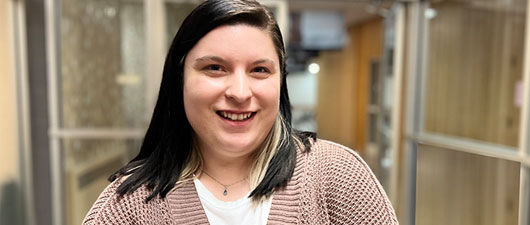Bachelor of Science in Education/Life Science
 Pictured | Mackenzie Moosbrugger | Bachelor of Science in Education, Secondary Education, Biology | Union, Michigan (hometown)
Pictured | Mackenzie Moosbrugger | Bachelor of Science in Education, Secondary Education, Biology | Union, Michigan (hometown)
Bachelor of Science in Education/Life Science
The Bachelor of Science in Education with a specialization in Secondary Education Life Science prepares individuals to teach a broad range of Life Sciences/Biology for grades 5-12. The program is aligned with the developmental and pedagogical standards for both the middle school/junior high and high school levels as defined by the Indiana Department of Education.
Programs are aligned to standards for the related Special Professional Associations (SPAs).
Academic Advising
Your academic advisor is a critical partner in fostering your success at IU South Bend and beyond. Your advisor will help you explore academic majors and careers, plan your degree, choose classes, learn about internships and study abroad, and much more. To see who is assigned as your advisor, visit your Student Online Advising Record in one.iu.edu. For more information about advising at IU South Bend, visit the website for the Undergraduate Advising Center.
Final responsibility for meeting degree requirements rests with the student.
Questions about advising? Email sbadvise@iu.edu or call (574) 520-4550.
Degree Requirements
Degree Map >>
Students receiving the Bachelor of Science in Education, Secondary Education (English Language) must complete 120 total credit hours including:
- IU South Bend Campuswide General Education Curriculum (33 cr.) to include
- MATH-M 215 Calculus I (3 credits apply toward General Education Curriculum; 2 credits apply toward Major Concentration)
Fulfills Fundamental Literacies: Quantitative Reasoning requirement - EDUC-F 201 Exploring the Personal Demands of Teaching: Laboratory Experience (2 cr.); AND
EDUC-F 202 Exploring the Personal Demands of Teaching: Field Experience (1 cr.)
Fundamental Literacies: Oral Communication requirement
- Major Requirements (85-86 cr.)
- Free Electives (balance to equal the 120 credit degree requirement)
- An overall GPA of 2.75 is required for admission into the Teacher Education Program (TEP).
- Students must successfully complete EDUC-F 201/EDUC-F 202, EDUC-H 340, EDUC-M 314, EDUC-P 250, and EDUC-W 200 to be eligible to enroll in Foundations II courses.
- All courses are 3 credit hours, unless otherwise noted.
Major Requirements (85-86 cr.)
- BIOL-L 101 Introduction to Biological Sciences I (5 cr.)
- BIOL-L 102 Introduction to Biological Sciences 2 (5 cr.)
- BIOL-L 211 Molecular Biology
- BIOL-L 304 Marine Biology; OR
BIOL-L 473 Ecology - BIOL-L 308 Organismal Physiology (5 cr.)
- BIOL-L 311 Genetics
- BIOL-L 318 Evolution
- CHEM-C 105 Principles of Chemistry I
- CHEM-C 106 Principles of Chemistry II
- CHEM-C 125 Experimental Chemistry I (2 cr.)
- CHEM-C 126 Experimental Chemistry II (2 cr.)
- CHEM-C 341 Organic Chemistry 1 Lectures
- COAS-Q 110 Introduction to Information Literacy (1 cr.)
Fulfills Additional Requirements: Information Literacy requirement - EDUC-K 205 Introduction to Exceptional Children
- EDUC-K 306 Teaching Students with Special Needs in Secondary Classrooms
- EDUC-M 301 Laboratory/Field Experience (1 cr.)
- EDUC-M 314 General Methods for Senior High/Junior High/Middle School Teachers
- EDUC-M 401 Laboratory/Field Experience (1 cr.)
- EDUC-M 420 Student Teaching Seminar (2 cr.)
- EDUC-M 446 Methods of Teaching Senior/Junior High/Middle School Science
- EDUC-M 464 Methods of Teaching Reading
- EDUC-M 480 Student Teaching in the Secondary School (10 cr.)
- EDUC-P 407 Psychological Measurement in the Schools
- EDUC-P 475 Adolescent Development and Classroom Management
- HPER-X XXX Any approved courses (2 cr.)
- MATH-M 215 Calculus I (5 cr.)
2 credits apply toward Major Concentration; 3 credits apply toward General Education Curriculum - PHYS-P 201 General Physics 1 (5 cr.)
- Any Biology Lab course above the 200–level (2-3 cr.)